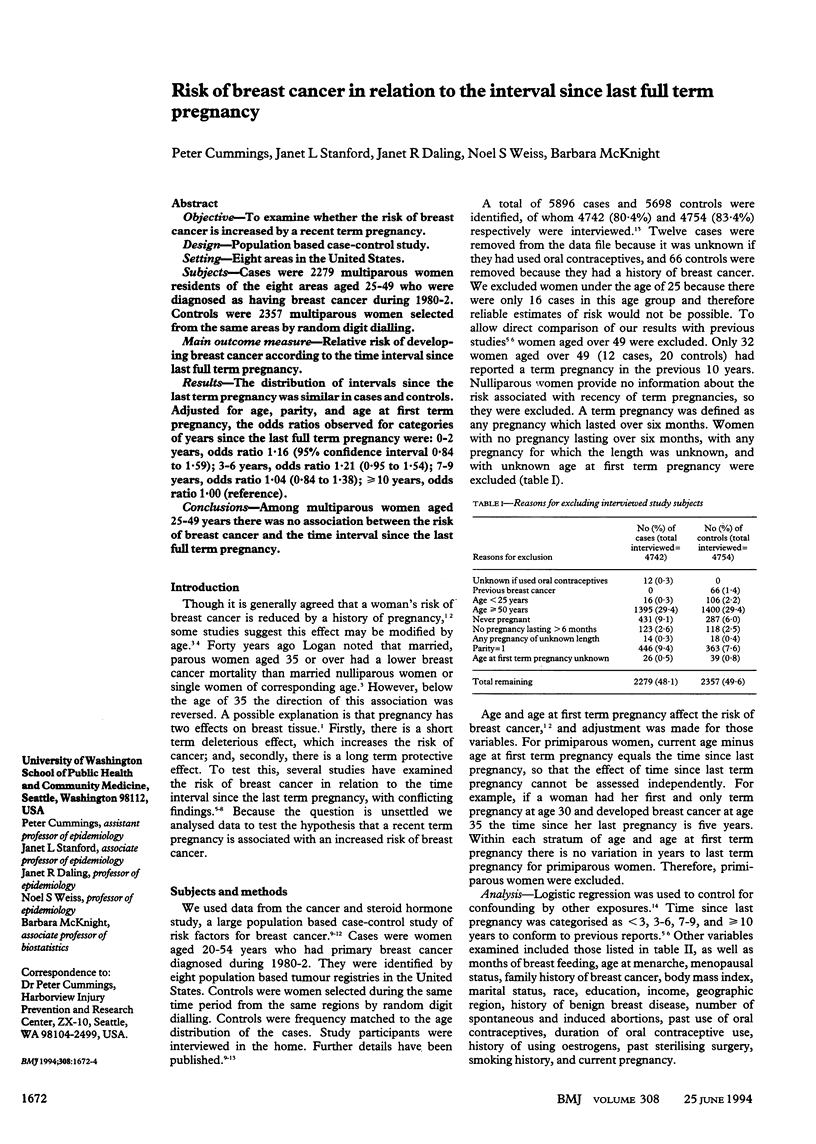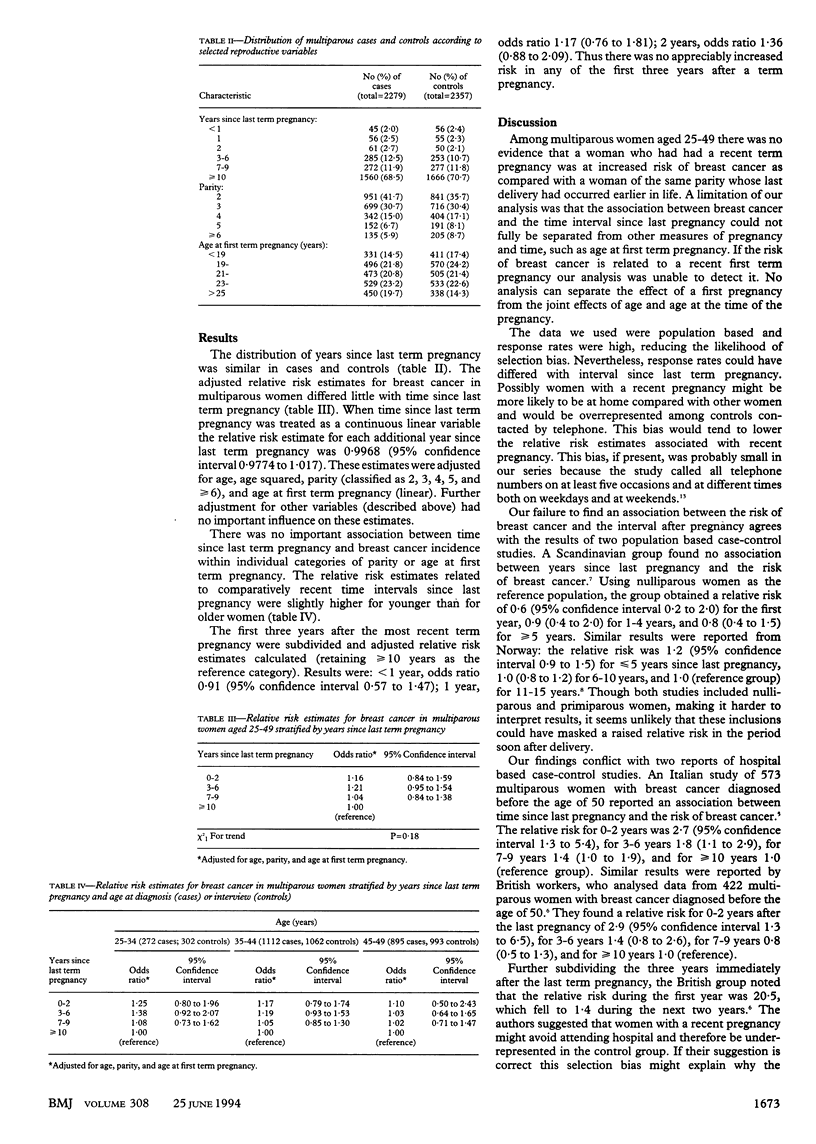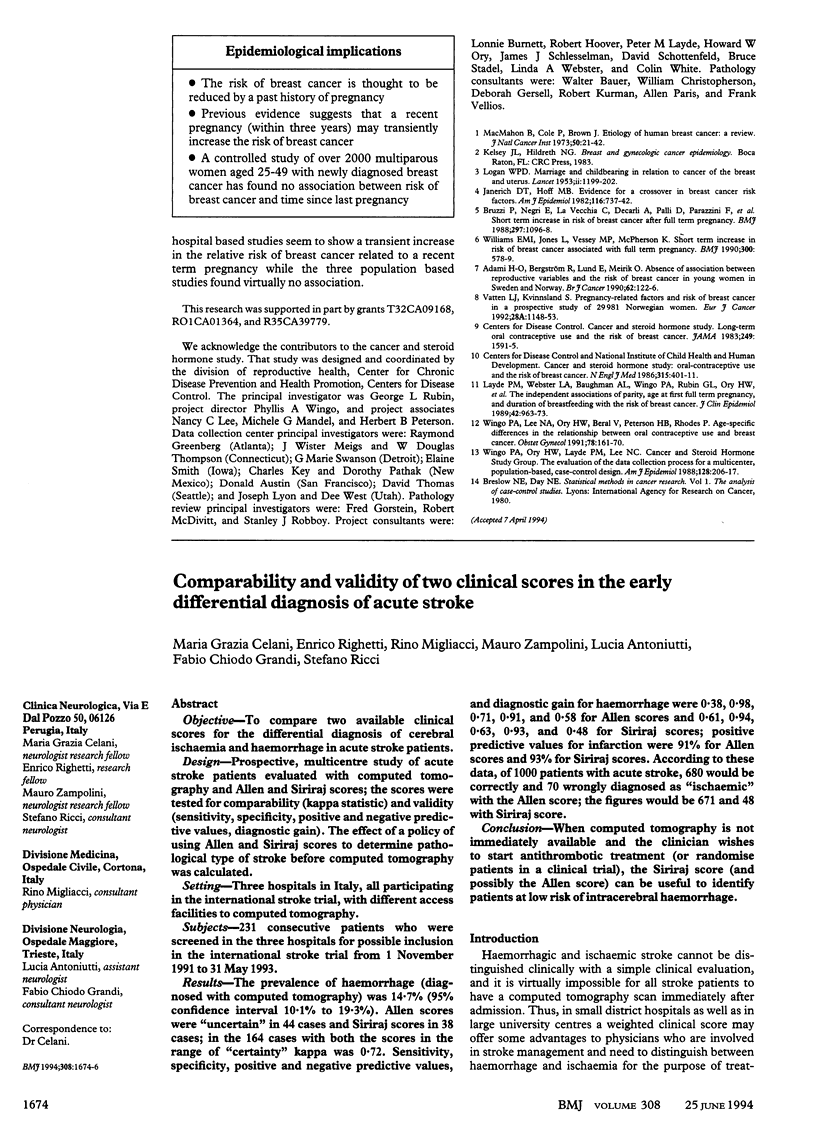Abstract
OBJECTIVE--To examine whether the risk of breast cancer is increased by a recent term pregnancy. DESIGN--Population based case-control study. SETTING--Eight areas in the United States. SUBJECTS--Cases were 2279 multiparous women residents of the eight areas aged 25-49 who were diagnosed as having breast cancer during 1980-2. Controls were 2357 multiparous women selected from the same areas by random digit dialing. MAIN OUTCOME MEASURE--Relative risk of developing breast cancer according to the time interval since last full term pregnancy. RESULTS--The distribution of intervals since the last term pregnancy was similar in cases and controls. Adjusted for age, parity, and age at first term pregnancy, the odds ratios observed for categories of years since the last full term pregnancy were: 0-2 years, odds ratio 1.16 (95% confidence interval 0.84 to 1.59); 3-6 years, odds ratio 1.21 (0.95 to 1.54); 7-9 years, odds ratio 1.04 (0.84 to 1.38); > or = 10 years, odds ratio 1.00 (reference). CONCLUSIONS--Among multiparous women aged 25-49 years there was no association between the risk of breast cancer and the time interval since the last full term pregnancy.
Full text
PDF


Selected References
These references are in PubMed. This may not be the complete list of references from this article.
- Adami H. O., Bergström R., Lund E., Meirik O. Absence of association between reproductive variables and the risk of breast cancer in young women in Sweden and Norway. Br J Cancer. 1990 Jul;62(1):122–126. doi: 10.1038/bjc.1990.242. [DOI] [PMC free article] [PubMed] [Google Scholar]
- Bruzzi P., Negri E., La Vecchia C., Decarli A., Palli D., Parazzini F., Del Turco M. R. Short term increase in risk of breast cancer after full term pregnancy. BMJ. 1988 Oct 29;297(6656):1096–1098. doi: 10.1136/bmj.297.6656.1096. [DOI] [PMC free article] [PubMed] [Google Scholar]
- Janerich D. T., Hoff M. B. Evidence for a crossover in breast cancer risk factors. Am J Epidemiol. 1982 Nov;116(5):737–742. doi: 10.1093/oxfordjournals.aje.a113462. [DOI] [PubMed] [Google Scholar]
- Layde P. M., Webster L. A., Baughman A. L., Wingo P. A., Rubin G. L., Ory H. W. The independent associations of parity, age at first full term pregnancy, and duration of breastfeeding with the risk of breast cancer. Cancer and Steroid Hormone Study Group. J Clin Epidemiol. 1989;42(10):963–973. doi: 10.1016/0895-4356(89)90161-3. [DOI] [PubMed] [Google Scholar]
- MacMahon B., Cole P., Brown J. Etiology of human breast cancer: a review. J Natl Cancer Inst. 1973 Jan;50(1):21–42. doi: 10.1093/jnci/50.1.21. [DOI] [PubMed] [Google Scholar]
- Williams E. M., Jones L., Vessey M. P., McPherson K. Short term increase in risk of breast cancer associated with full term pregnancy. BMJ. 1990 Mar 3;300(6724):578–579. doi: 10.1136/bmj.300.6724.578. [DOI] [PMC free article] [PubMed] [Google Scholar]
- Wingo P. A., Lee N. C., Ory H. W., Beral V., Peterson H. B., Rhodes P. Age-specific differences in the relationship between oral contraceptive use and breast cancer. Obstet Gynecol. 1991 Aug;78(2):161–170. [PubMed] [Google Scholar]
- Wingo P. A., Ory H. W., Layde P. M., Lee N. C. The evaluation of the data collection process for a multicenter, population-based, case-control design. Am J Epidemiol. 1988 Jul;128(1):206–217. doi: 10.1093/oxfordjournals.aje.a114942. [DOI] [PubMed] [Google Scholar]


